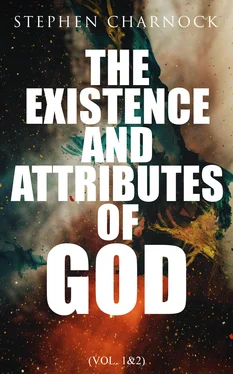Stephen Charnock - The Existence and Attributes of God (Vol. 1&2)
Здесь есть возможность читать онлайн «Stephen Charnock - The Existence and Attributes of God (Vol. 1&2)» — ознакомительный отрывок электронной книги совершенно бесплатно, а после прочтения отрывка купить полную версию. В некоторых случаях можно слушать аудио, скачать через торрент в формате fb2 и присутствует краткое содержание. Жанр: unrecognised, на английском языке. Описание произведения, (предисловие) а так же отзывы посетителей доступны на портале библиотеки ЛибКат.
- Название:The Existence and Attributes of God (Vol. 1&2)
- Автор:
- Жанр:
- Год:неизвестен
- ISBN:нет данных
- Рейтинг книги:3 / 5. Голосов: 1
-
Избранное:Добавить в избранное
- Отзывы:
-
Ваша оценка:
- 60
- 1
- 2
- 3
- 4
- 5
The Existence and Attributes of God (Vol. 1&2): краткое содержание, описание и аннотация
Предлагаем к чтению аннотацию, описание, краткое содержание или предисловие (зависит от того, что написал сам автор книги «The Existence and Attributes of God (Vol. 1&2)»). Если вы не нашли необходимую информацию о книге — напишите в комментариях, мы постараемся отыскать её.
The Existence and Attributes of God (Vol. 1&2) — читать онлайн ознакомительный отрывок
Ниже представлен текст книги, разбитый по страницам. Система сохранения места последней прочитанной страницы, позволяет с удобством читать онлайн бесплатно книгу «The Existence and Attributes of God (Vol. 1&2)», без необходимости каждый раз заново искать на чём Вы остановились. Поставьте закладку, и сможете в любой момент перейти на страницу, на которой закончили чтение.
Интервал:
Закладка:
(6.) Many that entertain the notions of the will and mind of God, admit them with unsettled and wavering affections. There is a great levity in the heart of man. The Jews that one day applaud our Saviour with hosannahs as their king, vote his crucifixion the next, and use him as a murderer. We begin in the Spirit, and end in the flesh. Our hearts, like lute‑strings, are changed with every change of weather, with every appearance of a temptation; scarce one motion of God in a thousand prevails with us for a settled abode. It is a hard task to make a signature of those truths upon our affections, which will with ease pass current with our understandings; our affections will as soon lose them, as our understandings embrace them. The heart of man is “unstable as water.” 168Some were willing to rejoice in John’s light, which reflected a lustre on their minds; but not in his heat, which would have conveyed a warmth to their hearts; and the light was pleasing to them but for a season, 169while their corruptions lay as if they were dead, not when they were awakened. Truth may be admitted one day, and the next day rejected; as Austin saith of a wicked man, he loves the truth shining, but he hates the truth reproving. This is not to make God, but our own humor, our rule and measure.
(7.) Many desire an acquaintance with the law and truth of God, with a design to improve some lust by it; to turn the word of God to be a pander to the breach of his law. This is so far from making God’s will our rule, that we make our own vile affections the rule of his law. How many forced interpretations of Scripture have been coined to give content to the lusts of men, and the divine rule forced to bend, and be squared to men’s loose and carnal apprehensions! It is a part of the instability or falseness of the heart, to “wrest the Scriptures to their own destruction;” 170which they could not do, if they did not first wring them to countenance some detestable error or filthy crime. In Paradise the first interpretation made of the first law of God, was point blank against the mind of the Lawgiver, and venomous to the whole race of mankind. Paul himself feared that some might put his doctrine of grace to so ill a use, as to be an altar and sanctuary to shelter their presumption (Rom. vi. 1, 15): “Shall we then continue in sin, that grace may abound?” Poisonous consequences are often drawn from the sweetest truths; as when God’s patience is made a topic whence to argue against his providence, 171or an encouragement to commit evil more greedily; as though because he had not presently a revenging hand, he had not an all‑seeing eye: or when the doctrine of justification by faith is made use of to depress a holy life; or God’s readiness to receive returning sinners, an encouragement to defer repentance till a death‑bed. A liar will hunt for shelter in the reward God gave the midwives that lied to Pharaoh for the preservation of the males of Israel, and Rahab’s saving the spies by false intelligence. God knows how to distinguish between grace and corruption, that may lie close together; or between something of moral goodness and moral evil, which may be mixed; we find their fidelity rewarded, which was a moral good; but not their lie approved, which was a moral evil. Nor will Christ’s conversing with sinners, be a plea for any to thrust themselves into evil company. Christ conversed with sinners, as a physician with diseased persons, to cure them, not approve them; others with profligate persons, to receive infection from them, not to communicate holiness to them. Satan’s children have studied their father’s art, who wanted not perverted Scripture to second his temptations against our Saviour. 172How often do carnal hearts turn divine revelation to carnal ends, as the sea fresh water into salt! As men subject the precepts of God to carnal interests, so they subject the truths of God to carnal fancies. When men will allegorize the word, and make a humorous and crazy fancy the interpreter of divine oracles, and not the Spirit speaking in the word; this is to enthrone our own imaginations as the rule of God’s law, and depose his law from being the rule of our reason; this is to rifle truth of its true mind and intent. ’Tis more to rob a man of his reason, the essential constitutive part of man, than of his estate; this is to refuse an intimate acquaintance with his will. We shall never tell what is the matter of a precept, or the matter of a promise, if we impose a sense upon it contrary to the plain meaning of it; thereby we shall make the law of God to have a distinct sense according to the variety of men’s imaginations, and so make every man’s fancy a law to himself. Now that this unwillingness to have a spiritual acquaintance with divine truth is a disowning God as our rule, and a setting up self in his stead, is evident; because this unwillingness respects truth.
1st. As it is most spiritual and holy. A fleshly mind is most contrary to a spiritual law, and particularly as it is a searching and discovering law, that would dethrone all other rules in the soul. As men love to be without a holy God in the world, so they love to be without a holy law, the transcript and image of God’s holiness in their hearts; and without holy men, the lights kindled by the Father of lights. As the holiness of God, so the holiness of the law most offends a carnal heart (Isa. xxx. 11): “Cause the Holy One of Israel to cease from before us, prophesy to us right things.” They could not endure God as a holy one. Herein God places their rebellion, rejecting him as their rule (ver. 9), “Rebellious children, that will not hear the law of the Lord.” The more pure and precious any discovery of God is, the more it is disrelished by the world: as spiritual sins are sweetest to a carnal heart, so spiritual truths are most distasteful. The more of the brightness of the sun any beam conveys, the more offensive it is to a distempered eye.
2d. As it doth most relate to, or lead to God. The devil directs his fiercest batteries against those doctrines in the word, and those graces in the heart, which most exalt God, debase man, and bring men to the lowest subjection to their Creator; such is the doctrine and grace of justifying faith. That men hate not knowledge as knowledge, but as it directs them to choose the fear of the Lord, was the determination of the Holy Ghost long ago (Prov. i. 29): “For that they hated knowledge, and did not choose the fear of the Lord.” Whatsoever respects God, clears up guilt, witnesses man’s revolt to him, rouseth up conscience, and moves to a return to God, a man naturally runs from, as Adam did from God, and seeks a shelter in some weak bushes of error, rather than appear before it. Not that men are unwilling to inquire into and contemplate some divine truths which lie furthest from the heart, and concern not themselves immediately with the rectifying the soul: they may view them with such a pleasure as some might take in beholding the miracles of our Saviour, who could not endure his searching doctrine. The light of speculation may be pleasant, but the light of conviction is grievous; that which galls their consciences, and would affect them with a sense of their duty to God. Is it not easy to perceive, that when a man begins to be serious in the concerns of the honor of God and the duty of his soul, he feels a reluctancy within him, even against the pleas of conscience; which evidenceth that some unworthy principle has got footing in the hearts of men, which fights against the declarations of God without, and the impressions of the law of God within, at the same time when a man’s own conscience takes part with it, which is the substance of the apostle’s discourse, Rom. vii. 15, 16, &c. Close discourses of the honor of God, and our duty to him, are irksome when men are upon a merry pin: they are like a damp in a mine, that takes away their breath; they shuffle them out as soon as they can, and are as unwilling to retain the speech of them in their mouths, as the knowledge of them in their hearts. Gracious speeches, instead of bettering many men, distemper them, as sometimes sweet perfumes affect a weak head with aches.
Читать дальшеИнтервал:
Закладка:
Похожие книги на «The Existence and Attributes of God (Vol. 1&2)»
Представляем Вашему вниманию похожие книги на «The Existence and Attributes of God (Vol. 1&2)» списком для выбора. Мы отобрали схожую по названию и смыслу литературу в надежде предоставить читателям больше вариантов отыскать новые, интересные, ещё непрочитанные произведения.
Обсуждение, отзывы о книге «The Existence and Attributes of God (Vol. 1&2)» и просто собственные мнения читателей. Оставьте ваши комментарии, напишите, что Вы думаете о произведении, его смысле или главных героях. Укажите что конкретно понравилось, а что нет, и почему Вы так считаете.












